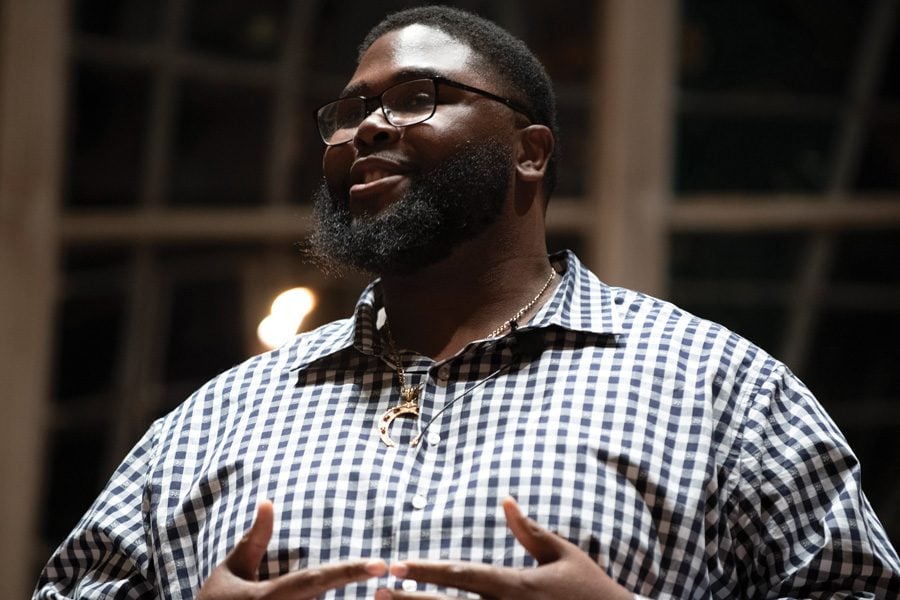Author Anthony Jack wants elite universities to do more to accommodate low-income, first-generation students
Coline Boyle/Daily Senior Staffer
Harvard Prof. Anthony Jack speaks at Alice Millar Chapel. Jack, who is the seventh speaker of the Nancy and Ray Loeschner Leadership Series, said elite institutions aren’t doing enough to accommodate low-income, first-generation students.
October 23, 2019
When Anthony Jack first set foot on Amherst College as a freshman in 2003, he asked himself: “Where are the poor black folks?”
He eventually found friends that were also low-income, first-generation students at an elite institution, but his experiences drove him to a different question: “What does it mean to be a poor student on a rich-student campus?”
Jack, who is now an assistant professor of education at Harvard University, explores that very question in his latest book “The Privileged Poor: How Elite Colleges Are Failing Disadvantaged Students.” In recognition of his work, the School of Education and Social Policy invited Jack to speak at Alice Millar Chapel on Wednesday to about 600 people. Jack is the seventh speaker of the Nancy and Ray Loeschner Leadership Series, which invites “visionary leaders” in education, SESP Dean David Figlio said.
“Tony Jack is an extraordinary leader himself,” he said. “I know that this book he’ll talk about tonight is one of the… most influential things I’ve read in the past year, and I hope that you end up being stimulated and challenged by it.”
During his talk, Jack criticized elite universities for their failure in accommodating poor, first-generation students. They might try to recruit low-income students, he said, but the effort generally stops there. Although the transition to college is much harder for poor students because of the difference in cultural capital, schools rarely acknowledge such struggles, he said.
“Citizenship is so much more than just being in a place,” he said. “It’s about access to all the widespread privileges.”
If universities are to properly integrate these students on campus, however, they need to understand that there’s a diversity in experiences among the low-income, first-generation population, he said. Following his research, Jack identified two different groups in elite campuses: the Doubly Disadvantaged and the Privileged Poor. The former group came from impoverished neighborhoods, while the latter attended elite prep schools. Both struggle in different ways, he said, and the University needs to be more proactive if they want to give both groups equal opportunities.
For Weinberg sophomore Vanessa Obi, Tony’s words were just what she needed to hear, she said. She never had the words to describe her experiences as a low-income, first-generation student on campus until she read his book, Obi said.
“It was really empowering to hear another person of color tell me as a student on this campus that the problems that I face on a daily basis are not my own, and that I’m not crazy,” she said.
If the University wants to improve low-income, first-generation students’ experiences on campus, they should acknowledge that not everyone comes in with the same set of knowledge, Obi said. Not everyone knows what office hours mean or how many credits are required, she said, which is why the school should be mindful about defining such language before normalizing it.
Jack, too, encouraged students to demand better from the University. Schools should not be allowed to tout diversity while failing to serve low-income students, he said.
“Demand as much from Northwestern as it demands from you,” he said. “Be unapologetic. Be bold. Be you.”
Email: [email protected]
Twitter: @ck_525












